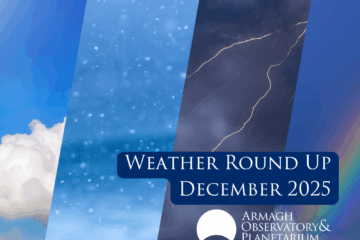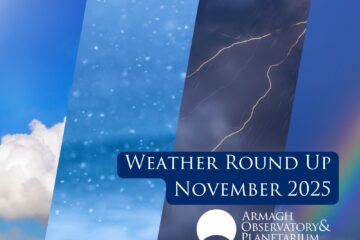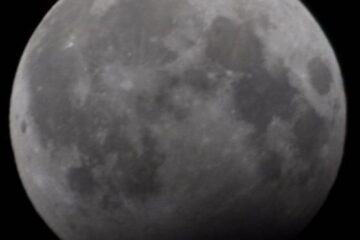AN INCLEMENT MONTH: WETTEST AUGUST FOR 12 YEARS, WARMER AND DULLER THAN AVERAGE. SUMMER 2020 THE DULLEST FOR 33 YEARS, WETTEST FOR 8 YEARS AND COOLEST FOR 5 YEARS
Armagh Observatory reports that August 2020 was the wettest at Armagh for 12 years, that is, since August 2008, and both warmer and duller than average. There were two named storms during the month. Taking the three months June, July and August together, the meteorological summer 2020 was the dullest for 33 years, the wettest for 8 years and the coolest for 5 years.
Total August precipitation was 147.15 mm (5.79 inches) including one trace value, that is, 147.10 mm if trace values are ignored. This is nearly 80% more than the long-term (1838– 2010) average August precipitation at Armagh and 93% more than the most recent (1981– 2010) 30-year August average. This August was the wettest for twelve years, that is, since August 2008, and the ninth-wettest at Armagh since daily rainfall records began in 1838.
The wettest day, namely 29.7 mm (1.17 inches) on the 24th, was dominated by rainfall from Storm Francis, the second named storm of the month, which crossed Northern Ireland during the early hours of the 25th. The second-wettest day was the 27th, which produced a further 22.7 mm (nearly 0.9 inches) of rainfall. Heavy rain showers were also noted on the 21st, 23rd and 26th. The mean temperature was nearly 16.0 degrees Celsius (60.7 Fahrenheit). This is approximately 1.4 C warmer than the long-term (1796 2010) average August temperature at Armagh and 0.6 C warmer than the most recent (1981–2010) 30-year August average.
The warmest day (highest maximum air temperature) was 25.3 C on the 13th, followed by 24.4 C on the 14th and 23.6 C on the 15th. This brief warm spell was the exception in a month that otherwise had unremarkable maximum temperatures. Following a cool July, these were the warmest few days at Armagh since June. The coldest day (lowest maximum air temperature) was 14.6 C on the 27th, followed by 14.8 C on the 29th. The warmest night (highest minimum air temperature) was 15.5 C on the 7th, preceded by 15.0 C on the 5th. The coldest night (lowest minimum air temperature) was 4.5 C on the 30th, preceded by 6.9 C on the 24th. There were two ground frosts, that is, nights in which the minimum grass temperature fell to less than or equal to zero Celsius, namely the 30th (-2.2 C) and the 29th (0.0 C).
The night of the 19th/20th was noteworthy in seeing the passage of Storm Ellen across Northern Ireland. This was the first named storm of the month, and was noteworthy in producing gale-force winds at Armagh in the early hours (around 03:00 GMT) of the 20th. In contrast to the previous year, which was the sunniest August for 16 years, this August 2020 recorded just 122.2 hours of strong sunshine. This was approximately 85% of the long term (1881–2010) average number of hours of strong sunshine at Armagh and nearly 92% of the most recent (1981–2010) 30-year average, making this the dullest August at Armagh for two years. The sunniest day was the 12th with 11.6 hours of strong sunshine, preceded by the 8th with 10.6 hours.
Taking the three months June, July and August together, the meteorological summer 2020 was the dullest at Armagh for 33 years, the wettest for eight years and the coolest for five years. Total summer precipitation was 302.05 mm (11.9 inches) including 7 trace values, that is, 301.70 mm if trace values are ignored. This was nearly 40% more than the long-term (1838–2010) average summer precipitation at Armagh and 53% more than the most recent (1981–2010) 30-year average. This was the wettest summer at Armagh for eight years, that is, since the very wet summer 2012.
The mean summer temperature was 15.09 C, which is 0.88C warmer than the long-term (1796–2010) average summer temperature at Armagh (14.21 C) and less than 0.1 C warmer than the most recent (1981–2010) 30-year average (15.00 C). This was the coolest summer at Armagh since 2015. The total number of hours of strong sunshine during summer 2020 was just 294.1. This is just 63% of the long-term (1881–2010) average number of hours of strong summer sunshine at Armagh and 71% of the most recent (1981–2010) 30-year average. This was the dullest summer at Armagh for 33 years and the third-dullest on record, that is, since daily sunshine records began at the Observatory in 1880. The three dullest summers at Armagh are now 1980 (281.8 hours of strong sunshine), 1987 (291.6 hours) and 2020 (294.1 hours).
FOR FURTHER INFORMATION PLEASE CONTACT: Mark Bailey at the
Armagh Observatory, College Hill, Armagh, BT61 9DG. Tel.: 028-3752- 2928; FAX: 028-3752-7174; mark.bailey@armagh.ac.uk; URL: http://climate.armagh.ac.uk/.



0 Comments